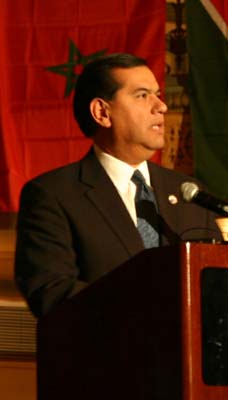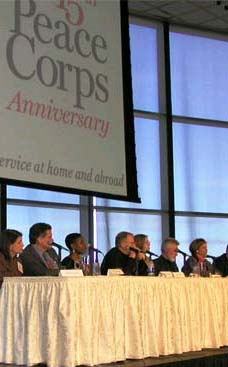2006.05.01: May 1, 2006: Headlines: COS - Niger: Medicine: Disease: Diabetes: The Third Age: Niger RPCV Ann Richards Ketcham remembers when diabetics used huge glass syringes they had to boil every day
Peace Corps Online:
Peace Corps News:
Peace Corps Library:
Medicine:
January 23, 2005: Index: PCOL Exclusive: Medicine :
2006.05.01: May 1, 2006: Headlines: COS - Niger: Medicine: Disease: Diabetes: The Third Age: Niger RPCV Ann Richards Ketcham remembers when diabetics used huge glass syringes they had to boil every day
Niger RPCV Ann Richards Ketcham remembers when diabetics used huge glass syringes they had to boil every day

"The good news is -- we thought this in the 1970s, but we didn't prove it scientifically until the '90s -- good control of the blood sugar on a daily basis can delay those complications," she said. "That is the really good news. If you educate yourself about the disease and take care of yourself properly, you can live a very productive and active life.
Niger RPCV Ann Richards Ketcham remembers when diabetics used huge glass syringes they had to boil every day
The Changing Face of Diabetes
By Jason Collington
Caption: Diabetes Needles, 1986. Photo: Diabetes Stories
Ann Richards Ketcham remembers when diabetics used huge glass syringes they had to boil every day. She remembers the large needles. She relives the image of patients experiencing the pain that came whenever those needles pierced the skin.
A lot has changed since 1976, when Ketcham was the first part-time staffer hired at the newly opened American Diabetes Association office in Tulsa, Okla.
So much has improved. Those needles don't hurt as much as they used to. Meters to test blood sugar are now the size of iPods, much smaller than when they filled small suitcases in the mid '70s.
More and more people are managing their disease.
"We unfortunately still see too many complications," Ketcham said recently, as she talked about her work over the past three decades. "In the mid '70s, only half of the people with the disease knew that they had diabetes. We have gotten that number down to a third. But there are still a lot of people in Tulsa, Okla., who have diabetes and don't know it."
When she tells the story of diabetes and Oklahoma, Ketcham, now the office's executive director, kept coming back to a common theme -- people still don't realize how serious the disease is. They know what it is -- a disease in which the body does not produce or properly use insulin. But they don't understand what it can cause.
Ketcham reeled off a series of facts from memory:
* Diabetes is the leading cause of blindness in adults.
* It's the leading cause of nontraumatic amputations.
* It causes kidney failure, strokes and heart disease.
* It's something doctors can proclaim as a cause of death.
* Every 60 seconds, someone is diagnosed with diabetes in the United States.
"The good news is -- we thought this in the 1970s, but we didn't prove it scientifically until the '90s -- good control of the blood sugar on a daily basis can delay those complications," she said. "That is the really good news. If you educate yourself about the disease and take care of yourself properly, you can live a very productive and active life.
"But still, we lose a lot of people. It's hard to watch diabetes take them."
Diabetes isn't something that Ketcham grew up with. She doesn't know anyone in her family living with the disease. But after spending years in Niger in west Africa with the Peace Corps, she came back to her native Tulsa with service in mind.
She had helped the poorest of the poor. She wanted to come back home and help people who, like those she lived with in those small African villages, simply didn't know how they could improve their lives. Ketcham wanted to teach them.
Soon, she found the ADA. In 1976, the word epidemic started being applied to the word "diabetes." For 30 years, that label has never been peeled off. The ADA estimates that 20.8 million children and adults in the United States, about 7 percent of the population, have diabetes.
Oklahoma has one of the highest rates of diabetes of any state, due to its high American Indian population and high rates of obesity. About one in 15 U.S. residents has diabetes ...
The Centers for Disease Control and Prevention recently estimated that of children born since 2000, one in three will develop diabetes before age 50.
That number increases to one in two for the Hispanic, American Indian and black populations. ...
"Until you know you have it, you won't take action," Ketcham said.
Without action come the complications. Ketcham has known people who have lost their feet, inch by inch, because they haven't controlled the disease.
"We are working to get the word out," she said. "We are going to see a lot of human damage if we don't. This has to be a priority."
Although diabetes is more prevalent than breast cancer and AIDS, it doesn't receive the same amount of funding for research.
"We don't think the funding needs to be decreased for any disease," she said. "We just want it to be equitable."
Ketcham and other ADA executive directors are looking at a debate raging in Washington, D.C. A proposed bill could wipe out laws in 46 states, including Oklahoma, that require insurance companies to offer coverage for medical supplies, equipment, services and education to help prevent or minimize health problems from diabetes.
"We hear from people who are uninsured," she said. "They can't buy supplies and pills. They are having to make a decision between buying groceries or buying insulin. That shouldn't be. We are the richest nation in the world."
Numbers Growing
Those kind of phone calls come every day. So do the ones from family members who say a loved one is in denial about his or her disease.
"There is denial because it doesn't hurt," she said. "I think back when I first started, and we would see a lot of denial. It's easy to convince yourself that nothing is wrong."
Ketcham said the ADA has made a lot of progress.
"But we still have a lot of work to do," she said.
She agrees with University of Oklahoma President David Boren, who has Type 2 diabetes, when he proposed building a center focused on treatment and research of diabetes.
When he announced his hope, he said, "Time is of the essence."
"He's right," she said. "We've come light years from 1976, but the numbers are increasing exponentially. Diabetes isn't going away."
Testing for Diabetes
To determine whether a human patient or a pet has pre-diabetes or diabetes, health care providers can conduct a fasting plasma glucose test or anoral glucose (FPG) tolerance test. Either test can be used to diagnose pre-diabetes or diabetes. The American Diabetes Association recommends the FPG because it is easier, faster and less expensive to perform.
To learn more about diabetes, go to www.diabetes.org.
Source: Tulsa World. Powered by Yellowbrix.
When this story was posted in May 2006, this was on the front page of PCOL:





Peace Corps Online The Independent News Forum serving Returned Peace Corps Volunteers
 | It's Official: Vasquez nominated to FAO
Exactly one week ago we predicted that Director Vasquez would soon be receiving a major ambassadorship. Today the White House confirmed that Vasquez will be the new Representative to the United Nations Agencies for Food and Agriculture replacing Tony Hall.
PCOL Comment: Director Vasquez, let us be the first to thank you for your service to the Peace Corps, congratulate you on your new appointment, and wish you good luck in your future endeavors. Although we have had our differences over the years and we opposed your nomination in 2001, we think you are leaving a solid legacy of accomplishment and have served the Peace Corps well.
Initiatives and Accomplishments: Vasquez's major initiatives and accomplishments since becoming Peace Corps Director include: an agreement with Mexico in 2003 to host volunteers, sending RPCVs to work domestically in Hurricane relief after Katrina, emphasis on recruitment of minorities and of community college graduates, upgrading Peace Corps' infrastructure especially IT upgrades in the online application tracking process and the Volunteer Delivery System, an emphasis on safety and security of volunteers including the creation of a Situation Room at Peace Corps Headquarters, modifying Peace Corps' "Five Year Rule" for employment, and the expansion of the Peace Corps to its highest level in 30 years. He is the third longest serving Peace Corps Director after Loret Ruppe Miller and Sargent Shriver. |
 | The Peace Corps Library
The Peace Corps Library is now available online with over 40,000 index entries in 500 categories. Looking for a Returned Volunteer? Check our RPCV Directory. New: Sign up to receive PCOL Magazine, our free Monthly Magazine by email. Like to keep up with Peace Corps news as it happens? Sign up to recieve a daily summary of Peace Corps stories from around the world. |
 | Interview with a Hit Man
RPCV John Perkins says that for many years he was an "economic hit man" in the world of international finance whose primary job was to convince less developed countries to accept multibillion dollar loans for infrastructure projects that left the recipient countries wallowing in debt and highly vulnerable to outside political and commercial interests. In this exclusive interview for "Peace Corps Online," Colombia RPCV Joanne Roll, author of Remember with Honor, talks to Perkins about his Peace Corps service, his relation with the NSA, "colonization" in Ecuador, the consequences of his work, why he decided to speak out, and what his hopes are for change. |
 | Peace Corps stonewalls on FOIA request
The Ashland Daily Tidings reports that Peace Corps has blocked their request for information on the Volkart case. "After the Tidings requested information pertaining to why Volkart was denied the position — on March 2 — the newspaper received a letter from the Peace Corps FOIA officer stating the requested information was protected under an exemption of the act." The Dayton Daily News had similar problems with FOIA requests for their award winning series on Volunteer Safety and Security. |
 | PCOL readership increases 100%
Monthly readership on "Peace Corps Online" has increased in the past twelve months to 350,000 visitors - over eleven thousand every day - a 100% increase since this time last year. Thanks again, RPCVs and Friends of the Peace Corps, for making PCOL your source of information for the Peace Corps community. And thanks for supporting the Peace Corps Library and History of the Peace Corps. Stay tuned, the best is yet to come. |
 | History of the Peace Corps
PCOL is proud to announce that Phase One of the "History of the Peace Corps" is now available online. This installment includes over 5,000 pages of primary source documents from the archives of the Peace Corps including every issue of "Peace Corps News," "Peace Corps Times," "Peace Corps Volunteer," "Action Update," and every annual report of the Peace Corps to Congress since 1961. "Ask Not" is an ongoing project. Read how you can help. |
 | PC announces new program in Cambodia
Director Vasquez and Cambodia's Deputy Chief of Mission Meng Eang Nay announced a historic new partnership between the Peace Corps and the Kingdom of Cambodia that will bring volunteers to this Southeast Asian country for the first time. Under King Norodom Sihamoni and Prime Minister Hun Sen, Cambodia has welcomed new partnerships with the U.S. government and other U.S. organizations. |
 | Peace Corps suspends program in Bangladesh
Peace Corps Director Gaddi H. Vasquez announced the suspension of the Peace Corps program in Bangladesh on March 15. The safety and security of volunteers is the number one priority of the Peace Corps. Therefore, all Peace Corps volunteers serving in Bangladesh have safely left the country. More than 280 Peace Corps volunteers have served in Bangladesh since the program opened in November 1998. Latest: What other newspapers say. |
 | Invitee re-assigned after inflammatory remarks
The Peace Corps has pulled the invitation to Derek Volkart to join the Morocco Training Program and offered him a position in the Pacific instead after officials read an article in which he stated that his decision to join the Peace Corps was in "response to our current fascist government." RPCV Lew Nash says that "If Derek Volkart spoke his mind as freely in Morocco about the Moroccan monarchy it could cause major problems for himself and other Peace Corps volunteers." Latest: Volkart reverses stance, takes new assignment in Paraguay. |
 | RPCV admits to abuse while in Peace Corps
Timothy Ronald Obert has pleaded guilty to sexually abusing a minor in Costa Rica while serving there as a Peace Corps volunteer. "The Peace Corps has a zero tolerance policy for misconduct that violates the law or standards of conduct established by the Peace Corps," said Peace Corps Director Gaddi H. Vasquez. Could inadequate screening have been partly to blame? Mr. Obert's resume, which he had submitted to the Peace Corps in support of his application to become a Peace Corps Volunteer, showed that he had repeatedly sought and obtained positions working with underprivileged children. Read what RPCVs have to say about this case. |
 | Why blurring the lines puts PCVs in danger
When the National Call to Service legislation was amended to include Peace Corps in December of 2002, this country had not yet invaded Iraq and was not in prolonged military engagement in the Middle East, as it is now. Read the story of how one volunteer spent three years in captivity from 1976 to 1980 as the hostage of a insurrection group in Colombia in Joanne Marie Roll's op-ed on why this legislation may put soldier/PCVs in the same kind of danger. Latest: Read the ongoing dialog on the subject. |
Read the stories and leave your comments.

Some postings on Peace Corps Online are provided to the individual members of this group without permission of the copyright owner for the non-profit purposes of criticism, comment, education, scholarship, and research under the "Fair Use" provisions of U.S. Government copyright laws and they may not be distributed further without permission of the copyright owner. Peace Corps Online does not vouch for the accuracy of the content of the postings, which is the sole responsibility of the copyright holder.
Story Source: The Third Age
This story has been posted in the following forums: : Headlines; COS - Niger; Medicine; Disease; Diabetes
PCOL32658
25




















